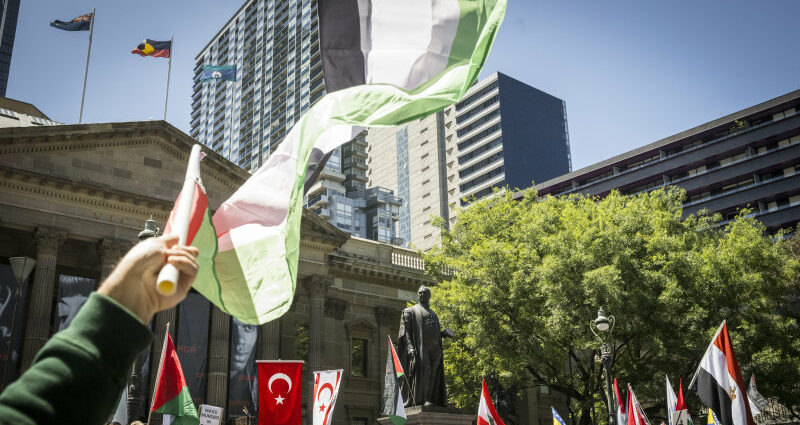Save articles for later
Add articles to your saved list and come back to them any time.
When properly conducted, protests, marches, rallies and sit-ins are fundamental aspects of a healthy democracy. They are vibrant and sometimes dramatic forms of freedom of expression and political communication.
Sure, they can be disruptive, causing traffic and pedestrian blockages. Sometimes they swell beyond organisers’ expectations. Occasionally, they change the course of governments.
Blood-soaked bundles purportedly representing corpses of Gazan civilians were left outside Labor politicians’ offices this week.
Consider the rallies against the Vietnam War; the decades of resolve of the Aboriginal Tent Embassy on the lawns of Parliament House; the marches demanding governments take action on climate change; the hurly-burly of industrial strikes and rallies. Consider also the quiet dignity of Michael Long’s long walk to Canberra.
In these days, when it seems rational, peaceful argument is too often swamped by impulse, high emotions, and occasionally violence, it is vital that we do not ignore the responsibilities that accompany civic freedoms.
This is especially so when passions are exacerbated, as they are now, by hotly contested disputes over political, cultural, religious, historical or social matters that stretch back decades, even centuries, and which have triggered wars elsewhere.
Tens of thousands of Australians have taken to the streets in recent weeks to vent their concerns over the Israel-Hamas war, which erupted after horrific and despicable murderous attacks on Israel by Hamas militants. Israel has responded to those attacks with a ferocious bombing of, and a military return to, the Gaza Strip, killing many thousands of Palestinian civilians in the past six weeks.
Mostly, the protests in Australia have been peaceful, if rowdy at times. That said, the theatrical stunt this week in which blood-soaked bundles purportedly representing corpses of Gazan civilians were dumped outside Labor politicians’ offices deliberately employed violent imagery to create shock.
More troubling, a small number of protesters elsewhere have resorted to violence. A man was hit by a rock thrown during a protest initiated by pro-Palestinians at a park opposite the Central Shule Chabad in Caulfield South last Friday night. The rally forced sabbath services to be abruptly terminated and worshippers evacuated. A counter-protest quickly gathered, and police faced ugly clashes as the two groups hurled abuse at each other.
At that protest and others, some participants have prominently displayed or uttered vile racist or religious insults, chanted incendiary slogans, or deliberately sought to provoke violence or cause distress, anxiety and fear.
Amid all this, there is evidence of a lamentable surge in antisemitism and Islamophobic slurs. Such conduct is deplorable, and should be prosecuted under hate speech laws.
Irrespective of how impassioned your opinion might be, the right to assembly, guaranteed under the International Covenant on Civil and Political Rights and, separately, under Victoria’s Charter of Human Rights and Responsibilities, specifically requires protest to be peaceful.
Australians value their freedoms highly, and street protests help to buttress our democracy by permitting a variety of grassroots views to be heard. But the right to assembly comes with responsibilities, and those responsibilities include not impinging on other people’s rights and freedoms, including the right to exercise their religious faith.
Authorities can restrict protests if they pose a realistic threat to national security, public safety or public health. Protests can also be banned if authorities perceive the need to protect the rights and freedoms of others.
The Andrews government did so in 2015, when it legislated to bar protests within 150 metres of abortion or fertility clinics. That ban came after decades of abuse and meddling by predominantly Christian anti-abortion protesters, who made it their daily duty to chide clients and staff entering a clinic in East Melbourne.
The state Liberals argue that recent events demonstrate that more is needed, and are seeking to reintroduce move-on laws introduced in the dying days of the Napthine government but dumped by Labor in 2015. Those laws would give police wide-ranging powers to order people off the streets, order them to move on, or bar them from entering or remaining in certain areas. The Liberals claim such laws are needed “to preserve public order”, and they point to the Caulfield South episode and reports of a separate incident when a group of neo-Nazis walked through train carriages asking if passengers were Jewish.
However, to achieve good policing and appropriate public order does not mean Victoria needs to become a heavy-handed state with disproportionate limits on civic freedoms.
The Age is a fervent supporter of freedom of expression and the right to protest. But Australia’s implied freedom of expression is not an unfettered right, and in a civil society there are limits to how we may express our opinions.
No matter what their view, protesters in Victoria must continue to resist violent, offensive and racist behaviour or risk losing support for their cause.
Most Viewed in National
From our partners
Source: Read Full Article
-
Bombshell study discovers simple ingredient could be key to living past 100
-
Mysterious limb-paralysis illness spreads at school as students go on ‘rampage’
-
Who is YouTuber Niko Omilana and what is his net worth? | The Sun
-
Flash floods tear down Las Vegas leaving casino and gamblers soaked
-
Gangland enforcer Billy ‘Bullet Man’ Isaac’s violent life and freak death


